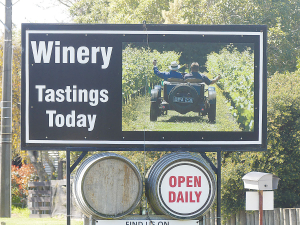Hard work keeping it on the straight and narrow
It's a hard road making wine on State Highway One, just south of Christchurch.
 Straight 8 Estate Winery owner James Shand says they are competing against big outfits that might routinely rip up and replace tens of thousands of vines each season in search of better yields or to follow changing varietal demand.
Straight 8 Estate Winery owner James Shand says they are competing against big outfits that might routinely rip up and replace tens of thousands of vines each season in search of better yields or to follow changing varietal demand.
Straight 8 Estate Winery owner James Shand says typical New Zealand wine buyers aren't going to help him meet his costs, because they can buy cheap imports at the supermarket.
He doesn't understand why New Zealanders drink cheap Sauvignon Blanc when it is not a globally popular variety.
"Why would I grow Sauv Blanc when it's only 11th in the world in white wine?" he told Rural News. "I grow the number one white wine in the world, which is Chardonnay."
Shand says they are competing against big outfits that might routinely rip up and replace tens of thousands of vines each season in search of better yields or to follow changing varietal demand.
When they bought the vineyard, they were advised to rip up the Cabernet Franc.
Instead, they have nurtured it, taken cuttings and taught themselves how to make and finish it, and it is now the most lucrative grape on the property.
Shand says that Cabernet Franc has now been planted in Central Otago, depriving his grapes of being the most southerly Cabernet Franc in the world. However, he is proud to say his vines are the most southerly growing on their own rootstock.
"I've got old grapes here that I've restored. I'm probably not your traditional vineyard person. I'm a restorer."
In search of cash flow, they are making some Pinot Gris this year from grapes bought from the defunct Lone Goat block.
But they otherwise pride themselves on being a single-vineyard winemaker, meaning they don't produce blends with grapes bought from elsewhere.
Shand believes good wine is made "in the vineyard" rather than in the winery and they have good soil with good flavours.
An independent report, prepared for Alliance farmer shareholders is backing the proposed $250 million joint venture investment by Irish company Dawn Meats Group.
Whangarei field service technician, Bryce Dickson has cemented his place in John Deere’s history, becoming the first ever person to win an award for the third time at the annual Australian and New Zealand Technician of the Year Awards, announced at a gala dinner in Brisbane last night.
NZPork has appointed Auckland-based Paul Bucknell as its new chair.
The Government claims to have delivered on its election promise to protect productive farmland from emissions trading scheme (ETS) but red meat farmers aren’t happy.
Foot and Mouth Disease outbreaks could have a detrimental impact on any country's rural sector, as seen in the United Kingdom's 2000 outbreak that saw the compulsory slaughter of over six million animals.
The Ministry for the Environment is joining as a national award sponsor in the Ballance Farm Environment Awards (BFEA from next year).

OPINION: For years, the ironically named Dr Mike Joy has used his position at Victoria University to wage an activist-style…
OPINION: A mate of yours truly has had an absolute gutsful of the activist group SAFE.